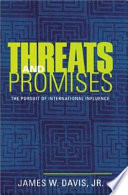
Threats and Promises
By - Davis, James W
Floor
-
Floor 1
Published
-
Johns Hopkins University Press, Baltimore, 2000
ISBN 10 - 0801862965
ISBN 13 - 9780801862960
Book Status
-
1 Qnty Available with us.
Subject
-
Beloften
Shelf No
-
15
Call Number
-
327.101 DAV
Physical Description
-
x, 222 pages
Notes
-
Includes Index